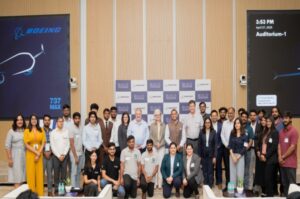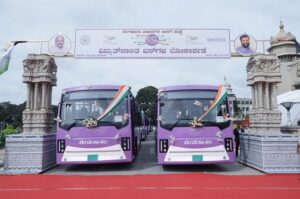The Boon of Development: MSME Sector

New Delhi: In countries like India, the MSME sector is considered the backbone of the economy. Not only is the MSME sector a significant source of job creation, but it also plays a crucial role in industrial development. The uniqueness of the MSME sector lies in its resilience and adaptability, which helps it remain stable during economic fluctuations.
To achieve the objectives of the MSME sector, Minister of Micro, Small, and Medium Enterprises, Mr. Narayan Rane, identified the obstacles and sought solutions to pave the way for its growth. As a result, during the period from 2021 to 2023, the progress of this sector has been significantly enhanced, thanks to Mr. Rane’s visionary decisions.
Due to the lack of necessary documents, many new entrepreneurs were unable to avail themselves of government schemes and bank loans under the MSME sector. The Prime Minister’s Mudra Yojana was initiated to assist such entrepreneurs. Under this scheme, collateral-free loans are provided to start new businesses or expand existing ones without any guarantee, through the Credit Guarantee Fund Trust for Micro and Small Enterprises.
To assist entrepreneurs who were unable to avail themselves of financial facilities, the “Entrepreneur Assist Platform” was launched on January 11, 2023. Within the first year, registration of over a million unorganized sector micro-enterprises was facilitated on this platform, making it easier for them to access loans.
The MSMEs bring diversity to various industries and encourage innovation. They often adopt new technologies and business models, contributing significantly to overall industrial progress.
Keeping this in mind, the government has taken several steps. For example, under the Cluster Development Program, a Central Sliver Plant was started in Karnataka with an expenditure of nearly 9 billion rupees, through the Khadi and Village Industries Commission or KVIC. The aim of the plant is to reduce the raw material cost for khadi institutions and increase production by up to 40% in the producers.
Similarly, there is also a plan for the rejuvenation of Mahatma Gandhi Institute for Rural Industrialization or rural industrialization. Under this plan, a sliver plant will also be started in Wardha district of Maharashtra as incubation centers. The aim of incubation centers is to promote new ideas and technologies.
Giving special attention to the khadi industry under MSME has a significant reason. In the past 9 years, khadi production has tripled. Its sales were only 1170 crores in 2014-2015. Khadi sales increased to nearly 6 thousand crores in 2022-2023. Today, we are exporting khadi products to more than 20 countries in addition to meeting our own needs. Today, this business has become a means of livelihood for many people besides millions of people associated with production, including designers, exporters, traders, and even banks. Even thousands of government jobs are running due to handloom and khadi trade.
Apart from khadi, efforts are also being made to help other sectors of the MSME sector. A plan has been initiated to open 20 technology centers and 100 extension centers across the country, which are supporting existing and potential MSMEs by enhancing production facilities, developing human resources, providing consultancy, and adopting best practices.
With the assistance of the World Bank, the RAMP scheme of around 6 thousand crores has been started. This scheme is proving helpful in the development of the MSME ecosystem by providing direct market access, loan availability, and strengthening institutions at the national and state levels.
The credit guarantee scheme has been redesigned to increase the flow of loans. The annual guarantee fee has been reduced to 0.37 percent and the guarantee limit has been increased from 2 crores to 5 crores.
The MSME sector has also made a significant contribution to realizing the vision of self-reliant India. The vision of self-reliant India is closely linked to job creation.
Substantial changes have been made in the Prime Minister’s Employment Generation Program for job creation. Along with the service sector, other projects of MSME have also been included. Through this scheme, so far, over 9 lakh enterprises have been provided economic assistance, creating more than 72 lakh jobs. The target for distribution in 22-23 was 2434 crores, while a margin money distribution of 2722 crores was made, surpassing the target.
Part of job creation is the inauguration of the PM Vishwakarma scheme. This is not only about job creation but also an ambitious plan to revive Indian traditional arts, crafts, and other strategies and establish their importance on the world stage. Under this scheme, Vishwakarma brothers and sisters will be provided training in 18 types of enterprises, tool kits, and collateral-free loans. The scheme, prepared under the guidance of the Honorable Prime Minister, will be a game-changer for Vishwakarma brothers and sisters. Under this scheme, registration has been done by more than 77 lakh people so far, which is more than double the target. The government’s plan is to help these products reach domestic and global markets through their production.
It is clear that besides khadi, other sectors of the MSME sector also play a significant role in India’s total exports. Efforts are being made to increase their share in exports. Opportunities are provided to participate in various international fairs to reach MSME products to international markets.
Goods and services produced by enterprises create India’s identity in global markets, leading to an increase in the country’s foreign exchange reserves. In addition, online markets like the GeM portal have been created for MSME products and services, providing an opportunity to participate in government procurement.
The MSME sector is also being made compatible with environmental challenges in line with India’s commitment. The ZED Certificate Scheme has been launched to inspire and encourage MSMEs to create zero effects and adopt zero effects. The ZED Certificate Scheme has also been linked to women’s empowerment. Women-owned MSMEs are given ZED certificates for free.
Overall, the MSME sector is making a significant effort to bring about economic equality. Through this single scheme, the vision of overall development of the country is being realized through job creation, industrial development, increased exports, and inclusive development. It is clear that if MSMEs are given proper support and encouragement, India can achieve its development goals rapidly and move towards a prosperous and inclusive society.
Mahesh Verma,
Former Media Head,
Delhi BJP,
National Media In-charge,
BJP Kisan Morcha,
Organizational Secretary,
Summit India,
National Advisor,
National Scheduled Caste Commission, Government of India.







